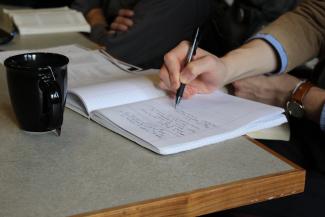
Overview
Combining an apprenticeship in rigorous, traditional scholarship with exposure to the most advanced work in literary and cultural theory, the program in comparative literature at Chicago prepares students to compete successfully for academic careers in both national literature departments and programs that stress comparative or interdisciplinary study. All students take a two-quarter sequence in their M.A. year that provides a solid grounding in literary criticism and theory and poses some of the central challenges facing literary scholars today. Students design the remainder of their program to serve their own interests, either studying several national literatures (with primary emphasis on one) or exploring the relationship between literature and another discipline. Students develop individualized dissertation topics working closely not only with the faculty in comparative literature but also with other professors from the department of the University that best complements their interests. These have included projects ranging from the myth of the artist to illusion, confusion and the Romantic imagination, from the hermeneutics of divination to the quest to fail, and comparisons between a wide variety of national literatures, such as Polish and Irish, Chinese and Indian, Russian and German, English and Portuguese along the African/Indian Ocean. Please see the Graduate Student section of the website for information about current research interests.
The University is famous for the vibrancy and intensity of its interdisciplinary studies and Comparative Literature students often work with faculty in many departments. The university is also renowned for treating graduate students as co-participants in the humanistic enterprise. Through a unique system of some forty interdisciplinary workshops offered annually, students and faculty together focus on topics of current interest, invite speakers from outside the university and share their own work in progress. Recent workshops at which comparative literature students have presented or are scheduled to present their work include: Poetry and Poetics; Literature and Philosophy; Metaphor; Medieval Studies; Renaissance Studies; Critical Animal Studies; African Studies; Modern France and Francophone Studies; East Asian and Trans-Regional Histories; Western Mediterranean Culture, and Theater and Performance Studies.
Ph.D. students will find many opportunities for scholarly engagement in lectures, conferences, workshops, and other activities fostered by the University's many research centers and institutes. These include:
- Center for Latin American Studies
- Center for Middle Eastern Studies
- South Asia Language and Area Center
Interdisciplinary centers include:
- Center for Gender Studies
- Center for the Study of Race, Politics and Culture
- Film Studies Center, Poetry and Poetics
- Franke Institute of the Humanities.
A standing joint degree program has also been established between Comparative Literature and the Committee on Theater and Performance Studies (TAPS). It allows students to complement their doctoral studies in Comparative Literature with a program of study in TAPS that reflects their particular training and interests, encompassing both academic and artistic work. Students apply to this standing program at the time of their application to the University.
Advising and Mentoring
Every new student will be assigned a faculty mentor who meets with them at least once a quarter to discuss course selection, and ongoing academic goals. Course plans must then be approved by the DGS in advance of the quarter. Since the faculty mentors are assigned based on joint interests, the faculty mentor may – but does not have to – become the student’s dissertation adviser. In addition, students meet with their faculty mentor and DGS at the end of each academic year to review progress and plan for summer and the following year. In the first two years of the program, students should also begin to approach specific faculty members for ongoing advising in their respective fields of interest so that they can elicit specialist guidance as they begin preparing for the qualifying examination.
Once students have finished coursework and are registering for fewer than 300 units per quarter, they will be automatically enrolled in an Advanced Studies course for up to 300 units with the instructor listed as the DGS (see the Arts & Humanities Division’s policy on academic progress). The pass/fail grades for this Advanced Studies course will be assigned by the DGS based on the annual review of student progress in the spring quarter.
The department relies on intensive mentoring to balance research and teaching priorities as part of each student’s pedagogical training plan. In the first year, students will consult with their faculty member about appropriate teaching plans, and these discussions will then be formalized in consultation with the DGS and Chair. In consultation with the DGS, mentors will make students aware of what courses faculty are teaching, including in the Core, and implement a procedure for matching students to instructors according to intellectual fit and research program.
